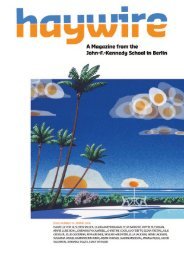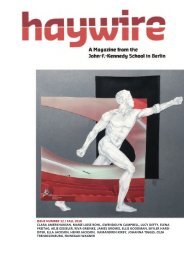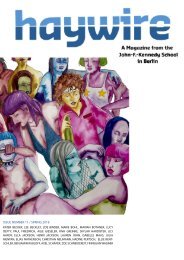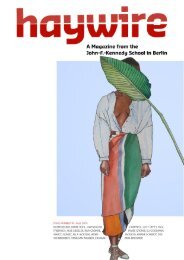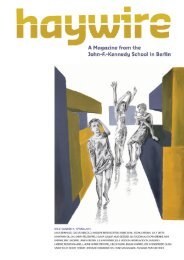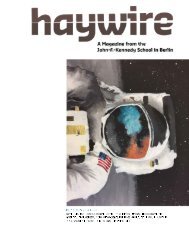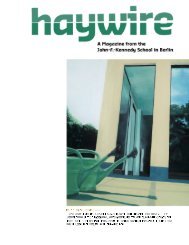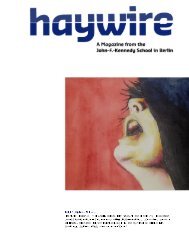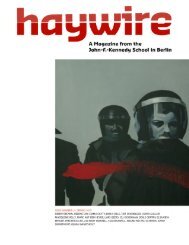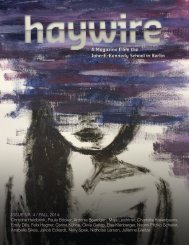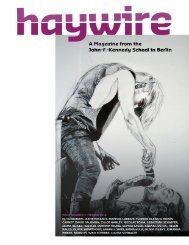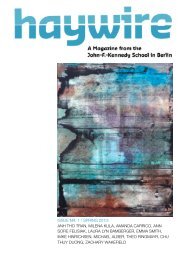HAYWIRE ISSUE 14 FALL 2019
literary art magazine
literary art magazine
Create successful ePaper yourself
Turn your PDF publications into a flip-book with our unique Google optimized e-Paper software.
CONTENTS
PUBLISHER’S NOTE 3
by Gwendolyn Campbell, 11a
THE EXPLICATION OF AN AUDIENCE IN ONE ACT 4
by June Gromis, 11a
THE GARDEN CHAIR 6
by Destiny Hein, 11d
METAMORPHOSIS 7
by June Gromis, 11a
INSIDE OUTSIDE 8
by Liliana Walker, 11d
ODE TO THE 20 MINUTE BREAK 10
by Sophie Meissner, 10f
CHILDREN 11
by Mathilda Gross, 10e
EVERYTHING CHANGES 14
by Skylar Hardister, 11d
UTOPIA 18
by Finn Kraft, 10b
THE MURKY VEIL 21
by Skylar Hardister, 11d
UNTITLED POEM 23
by Anonymous
MASTHEAD 24
Publisher’s Note
by Gwendolyn Campbell, 11a
Many talented and influential Haywire members
graduated last year, leaving the future
of the publication uncertain. Those departing
Haywire members took with them years of experience,
and I was genuinely concerned that
we would not accumulate enough members
to continue the legacy. You can imagine my
sense of relief and hope
after walking into the
first Haywire meeting of
the new school year and
seeing a room filled with
many new and eager faces.
It was clear to me with
the influx of new blood
that this meant a new beginning
for the magazine.
This led to the establishment of an open environment
in which fresh ideas could be expressed
and discussed. Naturally, we had a lack
of experience to make up for, which involved
days of learning the rudiments of design. Ultimately,
through everyone’s hard work and dedication
we overcame the challenges to make
an issue that meets the standard of quality of
Haywire that previous members had set for us.
Sorting through our submissions, we noticed
two prevailing themes - ‘identity’ and ‘dystopia.’
In this age of political and environmental
turmoil, it is no wonder that several submitted
works reflect a dystopian outlook. It seems
that each generation deals with its own sense
of impending doom. Thoughts of Cold War era
nuclear disaster weighed on
our parents’ teenage minds,
while our generation finds
itself in an age of information
overload, confronted
with incessant reminders of
global unrest, senseless violence
and climate disaster.
In the midst of all this,
each student is simultaneously
beginning to undertake
their own personal journeys for identity. Our
generation is pushing boundaries and redefining
the very concept of identity. Everyone
feels the clock ticking, yet we are in a time and
place where there is more potential than ever
to break free of antiquated ways of defining
ourselves and our surroundings, with the hope
of positively redefining our collective future.
HAYWIRE Issue 14 Fall 2019
3
HAYWIRE Issue 14 Fall 2019
4
The Explication of an
Audience in One Act
by June Gromis, 11a
Three stools lie upside down center stage. Upstage, three actors
named Chorus recite the closing monologues from Romeo and
Juliet, A Midsummer Night’s Dream, and Macbeth respectively as the audience
walks in to take their seats. Each actor moves to DS left, right or center respectively,
addressing the audience in their section. After the first two actors finish,
they take a small bow and wait quietly for the third actor to finish. When all
three have concluded, a recording of thunderous applause plays, while
three actors sitting amongst the audience, named Spectators, throw
roses on stage and cheer loudly. As the recorded applause comes to an end the Spec- tators continue to
show reactions. S1 starts screaming angrily, S2 mimics crying and wails, S3 stands
silently, in direct eye contact with the center chorus.
Spectator #3 slowly points at center chorus and whispers: You
S3 repeats the word slowly getting louder and his tone shifting from matter of fact
to accusatory.
S1 and S2 stop reacting and stare silently at their counterparts in the chorus.
When S3 has reached shouting volume, S1 and S2 join in, while pointing
quickly and rhythmically at their counterparts in the chorus.
S3 stops speaking, but continues to point at center chorus.
Left and right chorus jump off the stage and walk slowly towards their counterpart
Spectators.
As they reach them, S1 and S2 become silent, then revert to their original reactions.
Left chorus starts returning S1s anger, mimicking an argument. Right chorus embraces
S2 and comforts them, brushing their hand through S2’s hair, and whispering words of comfort.
S3 climbs up on stage and shakes center choruses hand, mimicking an amicable encounter between two
acquaintances. They now both stand silent, facing the audience but not making eye contact. S1 and left
chorus’ argument turns physical, and left chorus plays a punch to S1’s head, causing S1 to fall to the
ground motionless. Right chorus successfully calms down S2, they join hands and walk on stage using
the stairs, standing DS right facing the audience, but not making eye contact. Left chorus leaves S1,
skipping and whistling jovially as they walk on stage using the stairs, and stand DS left facing the audience
and making eye contact, then waving at specific people, all while skipping in place and whistling.
S2, S3, center and right chorus, start reciting the following, taking turns each word:
Welcome to this assembly, you have been summoned here today because you are all very naughty people.
S3: You decided to waste your valuable time and money to witness something you expected to have
some kind of impact on your life.
S2: Maybe you were even expecting guidance, or some kind of course-altering revelation.
Center chorus coldly: I regret to inform you that your application to be an audience member
witnessing a theatre production of quality and importance has been rejected.
S1 groaning: rejected.
Right chorus grabs one of the stools, walks down the stairs and sits down on
the stool next to an audience member at the end of a row.
Right chorus putting an arm around the audience member: Hey, your application was
great, I mean look at you! Beaming, then apologetically:
But you just didn’t make the cut.
S1 upper body jolting up: So you’re stuck watching this shit show! Laughs hysterically
for a few seconds then cuts off and jolts back, lying down motionless.
HAYWIRE Issue 14 Fall 2019
Art by Lauri Eckle, 11a
5
HAYWIRE Issue 14 Fall 2019
The Garden Chair
by Destiny Hein, 11d
A cold, familiar shadow approaches from a distance,
Waking me from my sleep.
And then, it places its forceful might onto my chest.
As I bend to its will,
The view of my sky stolen from above
My legs are thrust further into the earth.
It strokes my arms, sending shivers down my back.
I try to escape,
But I cannot move.
As the pressure adjusts itself,
With a powerful shift,
My structure breaks.
Photo by Elena Freitag, 12a
6
I stand
naked
before the
bathroom
mirror
A young
man
A young
man stares
back at me
His skin is
rugged,
blistered,
beaten his
face soft, but
patched with
stubbled hair
His figure is
lank and
nimble, his
chest flat and
boney His hair
is long and
groomed,
yet coarse
I don’t know
him very well at a
time I thought
we were one
and the same
When his gestures
and movements
still matched
mine and tricked
me into a false
sense of
communion
I know better now.
me t
amorphosis
her face
is soft, but
gilded by
wispy whiskers
Her figure is
lank, yet confident,
her chest
full and tender
Her hair is long
and groomed,
yet gentle
I am just
beginning to
get to know
her at a time
I thought we
couldn’t be
more different
When her heart
and soul were
obscured within
me
And tricked
me into a
false sense of
unfamiliarity I
know better
now
We are one
and the
same
A poem by
June G,
11a
HAYWIRE Issue 14 Fall 2019
I stand naked
before the bathroom
mirror a young woman
stares back at me her
skin is smooth,
unblemished, clear
Art by Gwendolyn
Campbell, 11a
7
HAYWIRE Issue 14 Fall 2019
Inside Outside
An Ode to Hawthorne
by Liliana Walker, 11d
He sat rigid in a room of his own and imagined
breaking the shackle of his imperfect
demeanor and joining the citizens of the
world in their cosmic charade. He would
bend in the wall by sheer force of will until
he, at last, had a foot in the door of his conception,
then, the sweet perfume of understanding
filling his lungs—a scent which cannot be explained
by those respiring it, except as the emanation
of acceptance—he would step outside
into the bright expanse of the people, shielding
his eyes from a shower of light. He had pushed
with all his might upon the door for a time that
may well have stretched to infinity, taking its
merry time, and once it arrived jaunted back toward
forever’s other end, and found there would
be no movement of the walls around him or the
earth beneath him unless some force greater
than himself—something divine, or a facsimile
of divine providence—willed either the world,
an unstoppable force, or himself—an object
immovable due more to the solid nails of misunderstanding
which bound his feet to the floor
and prevented him from rising, an uncanny rebuttal
to the Son of man—to restructure itself
for the other. Unfortunately for him, it was not
often the way of the divine to command the
earth to shake for man—but in this sense, nor
was it the quest of the greater forces to fracture
the sturdy bones of a character set in its ways,
whether out of pity, understanding, or a quiet
respect for his fruitless yet unrelenting labor
against something he could not govern.
To those who watched this uncanny, though
perhaps universal, struggle without comment
or without respect, he was marked, though
Art by Gwendolyn
Campbell, 11a
not in the realm of the physical—for one could
not see, hear, or feel (nor indeed smell or taste)
any demarcation—but by a brand perceptible
by every man, woman, and child by way of
the sixth sense we know and all possess, but
deny because we cannot control; the tingle—or
perhaps it is better said to be a flash, the ringing
of an alarum bell, a stinging sensation, or
indeed a mingling of all these; as our sixth
sense may well, instead of something new, be
a mixture of those earlier discounted faculties,
too—a delicate concoction that an alchemist,
wiser and older than life itself, measured out
with consideration—which cries out from the
edge of the unconscious, “outsider, beware!”
8
HAYWIRE Issue 14 Fall 2019
Art by Jacob Salomon, 10f
Art by Felix Barkow, 10c
9
Ode to the 20 minute break
by Sophie Meissner, 10f
HAYWIRE Issue 14 Fall 2019
Art by Savoy
Friedman, 7f
Scrambling away from the heated can, pressure building up with every second,
the tension becomes unbearable.
What we thought we could make has broken the order, the wailing arising to
the peak of a crescendo.
But a single sound cuts through my furrowed brow, all the glares alleviated
My left side brain diffuses into the right, ideologies consume me
Other ambivalent characters waiting for attention, waiting through my schedule
into my off
Trying to disperse themselves into my utopia, yet the aloof euphoria brings out
all the good I knew existed.
So I’ll smile with my cheeks, my eyes, my dimples
hoping that my aura radiates acceptance
hoping that something about me will make you comfortable with yourself
Watch the scars pulling down my neck evolve into a score, an overture
An intricate harmony, empathetic melody, a world where you can be forte or
piano and we’ll appreciate your interpretation all the same
And when my last breath rings out
and the songs in my bones release themselves
all you’ll hear
is the humming of the wind
But for now, I hope I will be happy
listening to the refrain of time
10
Children
by Mathilda Gross, 10e
As I walk past my
‘friendly’ neighbors’ “we
don’t call 911” signs, I am
already bathed in sweat. The
heat pounds its fists onto my
pale exposed skin. My mind is
numb, and my head seems
to be a magnet drawn by
gravity. I wish I would’ve
put up my “love your
neighbors, black, white,
gay, straight...” sign, or
basically anything to set
us apart from the flood of
“Trump 2020” signs that
are spreading as fast as the
wildfires in the north.
My Mom is too
afraid.
Our last one was
stolen, and in its place a little
yet threatening note lay
embedded in the cracked
and dry dirt.
My feet drag
across the black asphalt as
I come to a stop in front
of my school. I brush into
the barely air conditioned
hallway, past the lockers
and the numerous yet ineffective
“stop bullying,” “see something
say something” posters.
As I sit down in my
chair, my sweating legs stick to
the cheap wood. The class starts
with the metallic screech of the
bell, and we begin to analyze
the various quotable passages
of Orwell’s 1984. For my essay,
I want to compare them to
Trump’s tweets.
The class gently murmurs
while working.
English lit. classes are
about the most liberal education
you can get in this neighborhood.
I stare at my blank paper.
The lines seem like bars, keeping
my thoughts in check.
A few minutes later, I
get an idea.
Art by
Charlotte
Widmaier,
11a
When words are
forbidden, democracy dies.
When people are forbidden,
equality dies. And when
die, so
does our hope.
I stop scribbling across
the page. And when... what?
My eyes find the window,
and I begin to distract
myself by watching the steady
flow of first graders trickle into
the building. One little boy fails
to keep up. In contrast to his
bubbly classmates, he seems to
be apprehensive about starting
school.
I am deeply absorbed in
my thoughts, recalling my first
day here. It was not actually
that long ago. Maybe a
week?
My eyes are still on the
boy when he doubles over
in pain.
When his blood covers
the playground floor.
When the gunman thrusts
open our door, and shoots
my teacher in the head.
She is dead before her
blood reaches the floor.
The explosion of the bullet
has shocked the class
into absolute silence. 17
heads slowly turn towards
the young man’s gun. He
is cradling it like a child
in his arms. His face tears
into a contorted smile.
He raises the gun.
Nonononononononono.
This can’t be happening.
He advances into the classroom
leisurely, devouring our fear.
The lock-down-drill
sounds.
Too late.
He has all the time in the
world.
The girl next to me has
tears running down her face, her
hands clasped in silent prayer.
Nobody moves.
Until somebody does.
A little boy with slick
brown hair scurries towards the
window, trying to escape. Everyone
de-freezes. The windows
are splattered with blood. Three
11
HAYWIRE Issue 14 Fall 2019
HAYWIRE Issue 14 Fall 2019
12
more shots are fired. The blood
is everywhere.
The girl with the tears
falls into my arms, dead. Her
blood spills onto my pale, white
paper.
BOOM.
Another shot.
More.
There’s more blood.
And pain. It follows.
My arm. It’s on fire!
Blood. I can’t get away. I
stumble and fall into a river as
the gun fires again. And again.
Then everything is
still. I lie, pretending to be
dead as he walks out, checking
for survivors. From
behind my desk I can see how
he steps on someone’s fingers,
who screams in shrill agony.
He shoots. Silence.
He left. He’s gone!
I stay still and wait.
After a while I begin to claw
my way up, the dead girl’s
fingers still clinging to me.
Two or three people
are still breathing, groaning in
animal pain.
Help.
I need to get help.
And then everything
goes black and I’m falling.
Beep. Beep.
Beep. Beep.
Everything is so white
here. The covers are starchy and
have been washed one too many
times.
I stare at the wall, processing.
Nurses and doctors roll
in, and out. The dusty television
in the corner is on so that I
have something to do. The nurse
pushes in a wagon with colorless
lumps of mystery hospital food.
I stare at the tray. I don’t think
that I can make myself eat.
“Eat up my little one!”
the lady trills overenthusiastically.
Why? My mind draws a
blank when I try to recall her
name.
My mother comes in and
cries.
Before leaving, she
wordlessly places my school
backpack onto my bed. Its faded
Art by
Charlotte
Widmaier,
11a
pink color clashes with the rusty
bloodstains.
Is it mine?
“We’ll have to get you a
new one,” she states dryly.
The paper that I was
working on is inside.
All I can look at is the
blood on its white, pale surface.
A boy’s bed is rolled in,
next to mine. He has blond hair
that is matted with blood, and
his hand is swollen and bruised.
The nurse tells his parents about
his internal bleeding and a bullet
in his back.
I listen to his breath as
it rises and falls. My arm burns,
and I gradually fall asleep.
Waking up to wheezing
is scary. His breath was so even
and steady a few hours ago.
I turn to see his eyes
on me, pleading for help and
health that I can’t give. Frantic
doctors fumble with IVs and
tubes. All I can do is watch.
Hours later, I wake up
from my daze, the boy’s eyes
once again on mine.
To all those people-
I write with my good arm on
my bloody paper.
Who feel that we are ruining
their lives by taking something
away from them.
I pause, finding reassurance
gleaming through the dark and
continue:
Look into his eyes. His life is
being taken away. You are not
dying. He is.
The boy is trapped in a
dying body, his knowing expression
both an embrace and a slap
in the face.
By morning, he is dead.
They roll out his bed,
making way for a new one.
I didn't even know his
name.
Now, he is just another
grieving family, fighting for the
recognition of their loss, in a
world unable to give it to them.
The burning begins to
subside as the scar forms, but
the real pain is inside of me.
Blood is splattered
inside the walls of my mind. I
hear their yells and screams in
waking hours. But at night, their
faces visit me, asking why it
was them and not me.
I never thought something
like this could happen. It
was never me. I would stare in
understanding silence as pictures
of the victims from other
schools flashed on the television.
But I was always disconnected.
Trying to distract myself,
I write.
I write the English essay
that I will never turn in.
I read about every dead
face I never knew, until the dull
aching in my chest turns into
real sharp loss for the people I
could have had.
I mourn the life I will
never live. The life that was shot
on the day the man walked into
the classroom.
But I never end up
finishing that sentence, knowing
very well the answer, too cowardly
to face the truth.
Art by Ella
Jackson, 11a
HAYWIRE Issue 14 Fall 2019
children
13
HAYWIRE Issue 14 Fall 2019
Everything Changes
Poem by Skylar Hardister, 11d
Everything changes yet still stays the same
Everyone guilty but no one to blame
Every way out leads you back to the start
Everyone dies and breaks someone’s heart
Art by Ella Jackson, 11a
14
HAYWIRE Issue 14 Fall 2019
Drawing by
Jacob
Salomon, 10f
Drawing by
Charlotte
Widmaier,
11a
Drawing by
Savoy
Friedman, 7f
15
Photo by Sina Morgan, 8a
HAYWIRE Issue 14 Fall 2019
Photo by Helen Williamson, 11d
16
HAYWIRE Issue 14 Fall 2019
Photo by Ella Jackson, 11a
Photo by Ella Jackson, 11a
17
HAYWIRE Issue 14 Fall 2019
Utopia
by Finn Kraft, 10b
Art by Lars Eastman, 7b
Rob was definitely a mailman, but,
only being privy to a bronze Vocabulary Subscription,
couldn’t tell you so himself. Every
day, his duty by the Shareholders was to distribute
non-exclusive, binding, subscription, and royalty-based
rights to the citizens of the Shareholders
Incorporated Community. Logically, the
Shareholders Incorporated Community was the
property of Shareholders Incorporated, a private
party which held the indisputable, de facto rights
to all property in the vicinity, whether intellectual,
tangible or natural.
While sifting through the human experience
to discover commodities or necessities from
which profit could somehow be made, no stone
was left unturned. Words were patented, oxygen
was taxed, and, in order to monopolize the distribution
of light which would otherwise be unnaturally
disrupted by the presence of the Sun, a large,
opaque dome was erected above the Community.
The former two issues were elegantly addressed
by the Word Factory, a large industrial sector responsible
for the constant creation and destruction
of words and their licenses, as well as the categorical
surveillance of all sound, respiratory and
light-related activities. A convenient byproduct of
this large, energy-consuming venture was its emission
of noxious fumes and smog, although Rob
himself wondered if this was indeed an accidental
occurrence.
Rob awoke on a Tuesday afternoon in complete
darkness. He instinctively reached for the
small lamp on his nightstand, which emenated a
slight, flickering sliver of light, piercing the thick,
putrid smog, tainting the otherwise jet black air.
This shoddy lamp cast a silhouette on the neighbor’s
residence, a sloppy garblement of 7 walls
and 3 roofs strewn together in a seemingly random
pattern. This was in no way peculiar to Rob; after
all, houses were just as well subject to copyright as
all other objects, and such creative solutions were
commonplace in an age, where every man sought
ownership.
While dressing for the day, the mailman
tried to recollect last night’s dream. He vaguely
remembered a candle being involved.
Rob yearned to have a candle above all other
things; he could imagine its balmy arms playfully
flickering about in his room, tickling the barren
walls with shades of maroon and orange. Instead
of the cold, stark effulgence on his nightstand, the
mailman now pictured a soft blaze of light embracing
him, arousing a primal sense of warmth,
familiarity and belonging, otherwise foreign to
the slave of the supremely reigning capitalism.
This dreamscape was rudely dissolved when Rob
stubbed his toe while putting on a pair of socks.
Sharpened by the newfound pragmatism borne
from his swollen toe, Rob remembered why this
venerable possession was only the fodder of his
dreams. The burning of oxygen to create light was
strictly banned, as it could not be quantitatively
measured and taxed. Additionally, it inherently
violated the sacred belief that goods and services
could only be compensated for with money, with
the balance of opposing forces on both sides of a
transaction holding the monopoly of the Shareholders
in place. Although the Shareholders
advocated for a free market, candles, as well as
other fire kindling supplies, were only given to a
select few as an ultimate privilege for the financial
elite. Fire was rebellion, Rob thought to himself,
the usurper of the blatantly wily hypocrisy practiced
by the Shareholders.
Rob switched off his lamp and readjusted
his respirator before leaving his house. He took
a deep, purposeful breath. Rob surrendered himself
to the will of the Shareholders, policing
his every action and mannerism in the case that
it might be a thievery of some copyrighted idea
unbeknownst to him.
18
The Child Soldiers were omnipresent
on the streets, constantly patrolling, observing,
and eavesdropping to enforce the might of the
Shareholders. Surgically equipped with infrared
vision and superhuman hearing, these orphan
children of criminals who committed copyright
infringement were ruthlessly cunning, dedicated
to atoning for the sins of their parents by marauding
the looming darkness in search of criminals,
free-loaders, or the like. Dissent or desertion,
as well as all other ploys to violate the perfect
economy upheld by the Shareholders, was
capitally punished. Although death was certain for
all law-breakers, Rob had heard a multitude of stories,
all somehow involving either the offender’s
supply of oxygen being brutally cut off or being
beaten senseless by the vicious children.
The mailman had some difficulty orienting himself.
The intermittent isle of light was constantly at
odds with the murky tides breaking upon its shore,
with Rob dreading the treachery of crossing this
uncharted sea. It was like this, using the few clues
illuminated by these beacons of truth, that the
mailman had to deliver his letters.
Rob stumbled upon a grove of trees before
a derelict home. This was supposed to be the right
address: 777, Heaven’s Gates. He rang the doorbell.
No response.
Rob noticed a small shimmer of light
through the curtained windows. This definitely
meant someone was home; nobody would put
precious light to waste. He briefly hesitated, then
slightly pushed the door.
“Word delivery,” he announced. Rob was
frugal with his words. He heard some hushed
movements and the clicking of what he was certain
to be the light he saw outside
“Come in, young man,” a gnarled voice
uttered.
The mailman stepped into a room solely
occupied by a dusty yellow carpet, a battered
wardrobe, one single light socket, a wooden bed
and a frail man tucked under its sheets. It smelled
like soap, for some odd reason.
“Ah, yes, I thought my word of the week
would come at this hour. Read it for me, will
you?”
Rob shook his head, gesturing to the paper.
It stated that this license to the usage was exclusively
the property of Randolph Murphy, which
was quite peculiar; the Shareholders never gave
exclusive rights to an individual; everything was
theirs, and theirs to keep.
Rob handed him the envelope, then spoke
solemnly: “You must pay.”
The old man said nothing, but his bulbous
eyes seemed to speak over the guise of silence. “I
know your secrets; do you like fire?” they said, not
inquiringly, but with a daunting certainty which
was only enforced by the posing of such an obviously
rhetorical question which Rob knew the
answer to. Randolph took the envelope and hushedly
opened it without revealing its contents; he
flinched when accidentally brushing the inside of
the letter.
“Yes, I have something for you,” he uttered
after his eyes had spoken their turn, standing up
and opening the wardrobe.
Rob gasped. Inside it was a bundle of
candles, with their waxen lustre reflecting the stark
light which Murphy had on his nightstand. Suddenly,
Rob made sense of the flickering light and
the soapy smell; this man was a candle dealer!
“Here, take one. I know you want it,” he
snickered
Rob was befuzzled. “How?” was all he
could muster, and all he could say; such words to
describe his sense of awe were either unknown to
him or not in his Subscription.
“It shouldn’t matter to you. Take it.”
A single tear left Rob’s eye. “It… it’s
beautiful,” he stammered. Suddenly, Murphy’s
demeanor changed.
“What did you just say?” he brazenly
shouted, slamming the wardrobe shut. “You can’t
say that- they’re-”
The old man was cut short by a cascade of
glass, followed by a dozen scoundrels, armed to
the teeth, rushing into the room, their spiked boots
crunching the shards below them into a fine powder.
“Please, let me live, it was him!” the
dealer begged, before being promptly forced to the
ground and clubbed senseless.
“You have violated the
free market,” the children
squeaked in unison. “You have
endangered us all with your
selfish attempts to hoodwink the
Shareholders. You must die.”
Rob took one last longing
glance at his candle before
the Soldiers turned to him.
19
HAYWIRE Issue 14 Fall 2019
HAYWIRE Issue 14 Fall 2019
Art by
Charlotte
Widmaier,
11a
20
The Murky Veil
Poem and Photo by Skylar Hardister, 11d
A darkness looms in the sky
Silent, constant, feared
HAYWIRE Issue 14 Fall 2019
It moves along only to let a small
glimmer of joy peak through
Landing upon you
warm, calm, cherished
Making you feel complete
The darkness breaks exposing itself to you
Only to last a moment
Until the day opens its doors to you once more
21
HAYWIRE Issue 14 Fall 2019
Art by Lauri Eckle, 11a
22
HAYWIRE Issue 14 Fall 2019
I want to be there
The hot coffee burnt my tongue
I will wait for you
Even if it hurts
Poem by Anonymous
Photo by Isabella Robinson, 11d
23
HAYWIRE Issue 14 Fall 2019
A Literary Arts Magazine of the
English Department
John-F.-Kennedy High School
Teltower Damm 87-93
14167 Berlin, Germany
EDITORS IN CHIEF
Gwendolyn Campbell
Ella Jackson
EDITORS & DESIGNERS
Cade Beckley
Skylar Hardister
Destiny Hein
Ava Iro
Aidan Kvistad
Fintan Rising
Isabella Robinson
Jacob Salomon
Konstantin Thießen
Julia Waliszewski
Liliana Walker
CONTRIBUTORS
Skylar Esteves
Franzine Jackson
Sina Morgan
Enijah Okwu
Konstantin Thießen
COVER ART
Ella Jackson
PUBLISHER
Lee Beckley
WEBSITE
https://haywire.now.sh/
June Gromis
SUBMISSIONS
haywire@jfks.me
Published in Germany
Issue Nr. 14, Fall 2019 (23 January, 2020)






